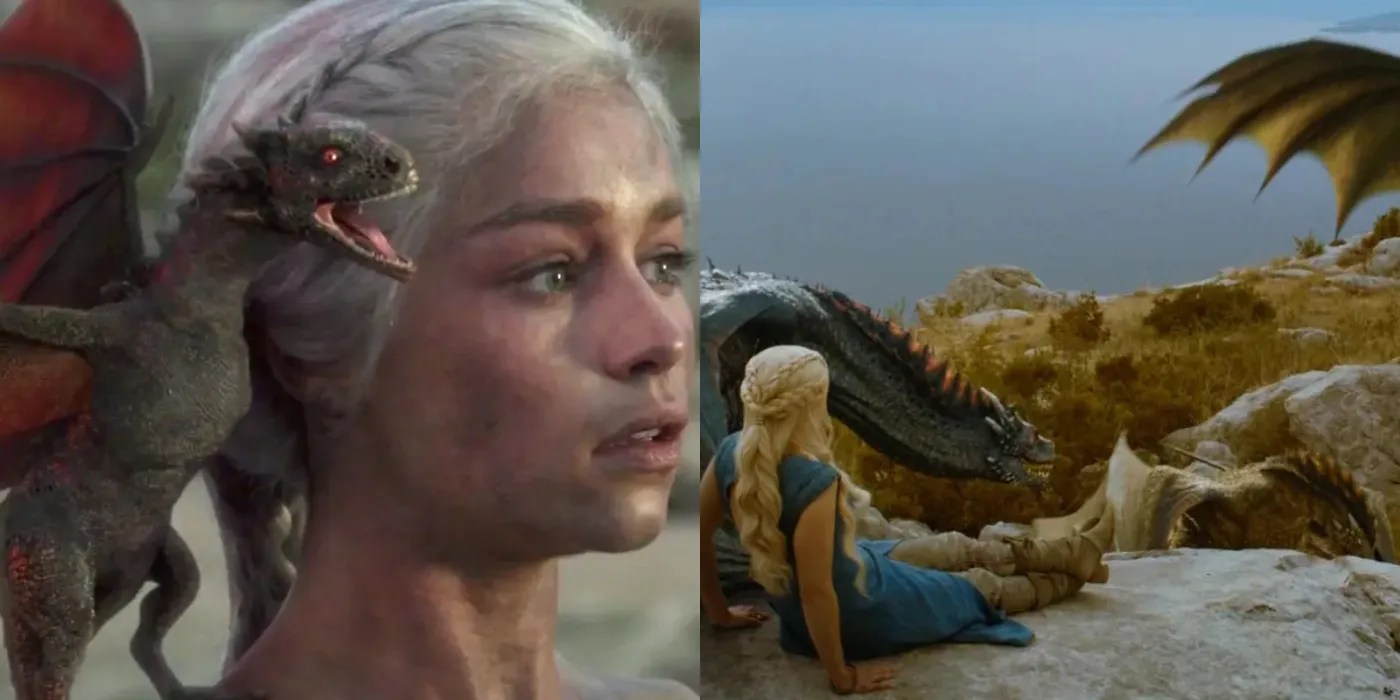Discovering The Legendary Dragons Of Daenerys Targaryen
In the vast world of George R.R. Martin's "A Song of Ice and Fire," the Targaryens have long been synonymous with dragons. Among them, Daenerys Targaryen stands out as the Mother of Dragons, a title she earned through her fierce determination and unique bond with these majestic creatures. With their striking beauty and immense power, Daenerys' dragons are not only pivotal to her story but also to the fate of Westeros itself. As we delve into the intricacies of her dragons, we uncover the stories behind their names, their characteristics, and their significance in the series.
Daenerys Targaryen's dragons are not just mere beasts; they are embodiments of her strength, hope, and ambition. Each dragon possesses its own personality and abilities, reflecting the complexities of Daenerys' character. From the moment they hatched, these dragons have been instrumental in her journey from an exiled princess to a formidable leader. Their fiery breath and formidable presence have helped her forge alliances and instill fear in her enemies, making them a vital asset in her quest for the Iron Throne.
As we explore the names of Daenerys Targaryen's dragons, we will also discuss their lineage and the unique traits that set them apart. Each dragon has a distinct name that carries weight in both the lore of the series and the hearts of the fans. Understanding these names and their meanings provides a deeper appreciation for the intricate world that George R.R. Martin has created. Join us as we embark on this journey to uncover the names of Daenerys Targaryen's dragons and the legends they represent.
What Are the Names of Daenerys Targaryen's Dragons?
Daenerys Targaryen is known for her three dragons, each with a unique name and history. The names of her dragons are:
- Drogon
- Rhaegal
- Viserion
Biography of Daenerys Targaryen
| Name | Daenerys Targaryen |
|---|---|
| Title | Mother of Dragons, Khaleesi, Queen of Meereen |
| Father | King Aerys II Targaryen |
| Mother | Queen Rhaella Targaryen |
| Born | In Dragonstone, approximately 284 AC |
| Notable Traits | Strong-willed, compassionate, determined |
| House | House Targaryen |
Why Are the Names of Daenerys Targaryen's Dragons Significant?
The names of Daenerys Targaryen's dragons are steeped in symbolism and personal meaning. Each name reflects the lineage and history of the Targaryen family, connecting Daenerys to her ancestors and the legacy of dragons. For instance, Drogon is named after her late husband, Khal Drogo, symbolizing their bond, while Rhaegal and Viserion pay homage to her deceased brother, Rhaegar Targaryen, and her late brother, Viserys, respectively. This connection to her family is crucial in understanding Daenerys' motivations and her quest to reclaim the Iron Throne.
What Are the Unique Traits of Each Dragon?
Each of Daenerys' dragons possesses unique traits that distinguish them from one another:
- Drogon: The largest and most aggressive of the three, Drogon is primarily black with red eyes. His fiery breath is exceptionally powerful, and he shares a close bond with Daenerys.
- Rhaegal: Named after Rhaegar Targaryen, Rhaegal is green with bronze eyes. He is known for his loyalty and is often seen as the second-in-command among the dragons.
- Viserion: Viserion, named after Viserys Targaryen, is cream-colored with gold eyes. He is slightly smaller than Drogon and Rhaegal but possesses a unique grace in the air.
How Do Daenerys Targaryen's Dragons Contribute to the Story?
The dragons play a pivotal role in Daenerys' journey throughout the series. They are not just powerful creatures used for destruction; they embody her growth and evolution as a leader. The dragons initially represent her vulnerability as she learns to harness their power, but as she gains confidence, they become instruments of her strength. Their presence on the battlefield often turns the tide in her favor, instilling fear in her enemies and rallying her supporters.
What Are the Challenges Daenerys Faces with Her Dragons?
Despite their immense power, Daenerys faces significant challenges in managing her dragons. As they grow, their needs become more demanding, and their temperaments can be unpredictable. The loss of her dragons during the series also serves as a poignant reminder of the consequences of war and the sacrifices she must make. Daenerys’ relationship with her dragons evolves, highlighting her struggles as a ruler and her desire to protect her beloved creatures.
What Is the Legacy of Daenerys Targaryen's Dragons?
The legacy of Daenerys Targaryen's dragons extends beyond her personal journey. They symbolize a return to a bygone era when dragons ruled the skies and the Targaryens were a force to be reckoned with. Their presence signifies hope for some and fear for others, making them a central theme in the battle for the Iron Throne. Ultimately, the dragons embody the complexities of power, loyalty, and the consequences of ambition.
In conclusion, the names of Daenerys Targaryen's dragons—Drogon, Rhaegal, and Viserion—carry profound significance, reflecting her personal connections and her family's legacy. Each dragon's unique traits and abilities contribute to the rich tapestry of the story, illustrating the challenges and triumphs Daenerys faces as she navigates her quest for power. Understanding the names and significance of these dragons provides deeper insight into Daenerys' character and the overarching themes of "A Song of Ice and Fire." Through her dragons, Daenerys Targaryen leaves an indelible mark on the world of Westeros, solidifying her status as the Mother of Dragons.
Article Recommendations
- Sela Ward
- Melvin Franklin
- Daniel Ezra Wife
- Andy Bassich
- Onur Tuna Wife
- Barron Trump And Girlfriend
- Carol Ann Susi
- Trumps Incontinence
- Recall On Noodles
- Alice Cooper


